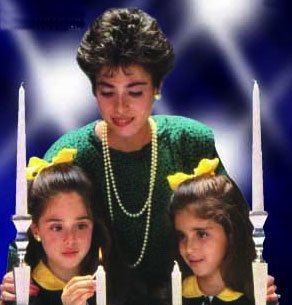|
With regard to the general offerings for the construction of the Mishkan , the Tabernacle, the Torah tells us in Vayakhel that “any person inclined to give an offering”1 could do so. This of course included both men and women. In fact, the Torah goes on to relate2 that “the men accompanied the women,” which our Sages3 interpret to mean that, in giving, the men were subservient to the women.
This being so, why is it that in the earlier portion of Terumah , when discussing the donation of these gifts, the Torah says:4 “from any man  whose heart moves him to give” — an expression that seems to exclude women? whose heart moves him to give” — an expression that seems to exclude women?
One of the aspects in the relationship between men and women is that of giver and recipient. This is why the union between G-d and the Jewish people is likened to that between groom and bride.
This is also why the Written Torah is called the “moral exhortations of your father ,”5 while the Oral Torah is called “the Torah of your mother.”6
The difference between the Written and Oral Torah is that the Written Torah was transmitted entirely from the Giver Above, while the revelation7 of the Oral Torah is through the Jewish people — the recipient, the woman.
This aspect filters down to physical man and woman as well, and is observed within the Jewish people; women are more spiritually receptive than men. We therefore observe that women need not be exhorted as often as men regarding their observance of Judaism, the reason being that their faith is instinctively more revealed and their fear and awe of G-d is greater than men’s.8
We find this to be so as well with regard to the Torah’s first commandment, to “be fruitful and multiply”9 — a command incumbent on men but not women. Why are women not so commanded?
The reason is that a man must be commanded to “be fruitful and multiply,” for his innate nature might not otherwise move him to reproduce.
A woman, however, is not in need of this command, for feeling as she does that her mission is to establish future generations, she does so of her own volition.
This is also one of the reasons why, in preparing the Jews to receive the Torah, G-d instructed Moshe to inform the women about the forthcoming event in a gentle tone, while the men were to be told in a harsh manner.10 Even a gentle tone sufficed to prepare the women; their character was such that they strongly desired to receive it. The men, however, had to be told in a harsher fashion, as they were not as receptive to the idea of having to follow all the commandments.
This difference also came into play regarding the gifts for the Mishkan : Jewish women excelled in the offerings that had no established criteria as to amount, obligation, etc. These gifts came strictly because the donors were moved to give. In this aspect the women were clearly superior.
The earlier portion of Terumah , however, concentrates on the two offerings which the Jews were obliged to bring because G-d had so commanded. That was not the place to emphasize the unique qualities of women in relation to free-will gifts.
It is specifically in the portion of Vayakhel , where the Torah emphasizes the eagerness with which the Jews gave their voluntary gifts, that it is most germane to stress the superior quality of the Jewish women.
Based on Likkutei Sichos , Vol. XXVI, pp. 266-268.
FOOTNOTES
1. Shmos 35:5.
2. Ibid. verse 22.
3. Ramban ibid. See also Ibn Ezra and Rabbeinu Bachye ibid.
4. Shmos 25:2.
5. Mishlei 1:8.
6. Ibid. Iggeres HaKodesh 29, quoting the Zohar; Torah Or, Vayakhel 88c; Likkutei Torah, Shemini Atzeres 85b.
7. Although this, too, was given on Sinai, for “All the mitzvos given to Moshe were given with their commentary” — Rambam, beginning of his introduction to Yad HaChazakah.
8. See Or HaTorah , Tehillim p. 432; ibid. Nach II, p. 927.
9. Bereishis 1:28.
10. Shmos 19:3 and Mechiltah ibid.
|
